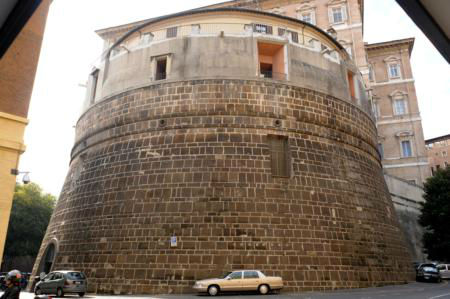The indomitable, and effective, Cardinal Pell
Shortly after George Pell was named Archbishop of Melbourne, he instituted several reforms at the archdiocesan seminary, including daily Mass and the daily celebration of the Liturgy of the Hours, both of which had fallen by the wayside in the preceding years. The seminary faculty, enthusiastic proponents of Catholic Lite, thought to call the archbishop's bluff and informed him that, were he to persist in such draconian measures, they would resign en masse.
The archbishop thanked them for the courtesy of giving him a heads-up, accepted their resignations on the spot, and got on with the reform of the Melbourne seminary--and the rest of the archdiocese.
The defenders of the status quo in the Vatican may have been unaware of this episode when they recently tried to take down the man chosen by Pope Francis to clean up the financial mess the Argentinian pope inherited two years ago. Like their predecessors in Melbourne, the leaders of a nasty campaign of personal accusation against Cardinal Pell, conducted by leaks to the ever-sleazy Italian media, failed. I hope that failure will be a lesson to such scoundrels in the future: don't mess with a former Australian rules football star who likes contact sports. That may be hope-against-hope. But we are obliged to believe that conversion, even among curialists native to the boot-shaped peninsula, is not beyond the power of God's grace.
Pope Francis was elected by a conclave determined that the next pontificate should clean up what Msgr. Ronald Knox used to call the "engine room" of the Barque of Peter. In the ensuing two years, there's not been a whole lot of progress in curial reform. The striking exception to that rule is the result of the pope's most successful reformist appointment: that of George Pell as head of a new super-dicastery in the Roman Curia, the Secretariat for the Economy, with a mandate to make the Vatican "boringly successful" as a "model of good financial practices," as Cardinal Pell likes to tell reporters.
Under the Australian cardinal's leadership, the Vatican bank has been cleaned up and cleaned out. Proper financial procedures--no-brainers in most institutions but shockingly new in the tribal atmosphere of the Vatican--have been implemented. Budgeting and auditing are now conducted according to accepted professional standards.
It was all, evidently, too much for some. And the entirely predictable personal attack on Cardinal Pell followed--the most risible part of which involved the spurious charge that the cardinal had spent large sums of Church monies turning himself into a clothes horse. (I have known George Pell for 47 years, since he spent a summer in my home parish in Baltimore between ordination in Rome and doctoral studies in Oxford; and I do no disservice to my old friend by noting that his sartorial style more readily evokes "Salvation Army Thrift Shop" than "Brooks Brothers.") But calumny, alas, is what happens when people who have long thought of the Church as their private property, and perhaps even their private piggy-bank, run into a determined and incorruptible reformer who understands that financial probity is essential to our being the "Church in permanent mission" to which Pope Francis has called us.
And that brings me to something else with which the scofflaws who attacked Cardinal Pell hadn't sufficiently reckoned: he's doing what he's doing, not as a gimlet-eyed bean-counter, but as a disciple and pastor who, like the pope, understands that the Church's proclamation of the Gospel is impeded when the Church's institutional integrity is threatened by corruption: sexual, financial, or both. George Pell remade the Catholic Church in Australia (which, pre-Pell, was headed in the direction of the moribund local churches in the Netherlands, Belgium and Germany) by reforming Catholic institutions that had become sinecures for time-servers rather than launch-pads for the new evangelization. He's now doing the same in Rome, with the unstinting support of Pope Francis.
Some might call Pell's job "mission impossible." I say, in proper Aussie, "good on 'im." And to those of a wagering spirit--don't bet against him.
George Weigel is a senior fellow of the Ethics and Public Policy Center in Washington, D.C.
- George Weigel is Distinguished Senior Fellow of the Ethics and Public Policy Center in Washington, D.C.



















